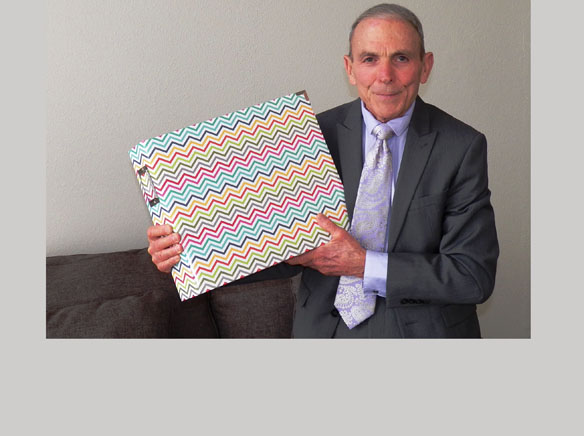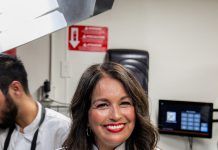Dr. Corey Marco has a new office, several paces down the street from his former medical practice facility. Framed degrees and awards hang on his office wall, but none of those relate to his 40 years as a physician in El Cajon.
Marco retired from medicine as December ended, and he is proud of a thick binder full of personal notes, cards and thank-you letters from patients who deeply regret his departure from being their doctor. He shared these remembrances during an interview on Jan. 9.
Dr. Corey Marco has a new office, several paces down the street from his former medical practice facility. Framed degrees and awards hang on his office wall, but none of those relate to his 40 years as a physician in El Cajon.
Marco retired from medicine as December ended, and he is proud of a thick binder full of personal notes, cards and thank-you letters from patients who deeply regret his departure from being their doctor. He shared these remembrances during an interview on Jan. 9.
At a very healthy and energetic 74 years of age, however, Marco has embarked on a different career. His new practice is in law. He intends to work as an attorney-consultant to other attorneys, specializing in medical injury issues, such as malpractice and wrongful death. Those degrees on his new office wall are from his studies and teaching in law.
Welcome to a story of never too late to live out a personal dream.
Corey Marco earned degrees in medicine and in law. As he describes the turn of his youthful planning, he was caught between envisioning himself as a physician or a lawyer. Three years into his undergraduate study at UCLA, he was accepted for medical school. But he ended up studying both, earning degrees in medicine and law, thinking he’d practice both or use the two fields of expertise in tandem.
The original idea he had for his life is now coming into fruition.
Marco started his medical practice in El Cajon in 1977. On the first day his office was open, he had two walk-in patients. “I never really planned it this way. It just worked out that medicine came first,” Marco reflected.
Marco has lived in La Mesa since 1974. He bought a house for his family on Mt. Helix for $130,000 and is still living there.
Retirement as a doctor hasn’t been easy for Dr. Marco or for patients under his care. “Having to adjust to retiring has been hard,” he said. “This would be easy and simple, I thought so. The last two months pulling away were difficult, with second, third, fourth generation patients, and sorrowful separations. That last month was the most difficult of all during my practice.”
Marco didn’t realize how much he meant to his patients in their lives.
Until retirement, he had been too busy with medicine to practice law. “I think I speak medical-ese and legal-ese,” he explained. He intends to assist other attorneys by analyzing case records, medical chart files, and interpreting health care events. “I believe I can be helpful for attorneys,” he said. And he might provide expert witness testimony at times.
He has utilized his legal degree, teaching law school courses at the University of San Diego that dealt with medical malpractice and ethical issues in which law and medicine intersect. “Teaching kept me on my toes,” he said. He plans to teach again.
“This is the right time for me,” Marco noted of his decision to use his law degree. “I have the energy to do this, and this is going to be a fun ride.”
Prior to starting in private practice as a physician, Marco worked for the Public Health Service, for the VA, and for the State Department as a doctor in Africa treating American diplomats and expatriates. He was assigned to Guinea, on the west coast of Africa, and he was the only physician in the country. “I had to learn on the job,” Marco recalled. “I had to become self-sufficient and independent, and I had to do the nursing end of the job too.” He’d learned to speak Spanish, but he quickly picked up as many French phrases as he could. (Guinea was a former colony of France.)
That self-sufficiency and independence served Marco well, as he was the only physician practicing in the medical complex in El Cajon over those 40 years. He said that the most difficult episodes occurred when four patients suffered heart attacks while in his office. “What a change from Africa,” he said. “We barely had working phones there. Here, we could call 911 for paramedics to get the help we needed for those patients.”
What major changes in medicine has Marco seen? He mentioned two examples in particular. “There have been tremendous changes in medicine,” he began, “unbelievable things unimaginable when I started. And I thought medicine 40 years ago was exciting.” According to Marco, gallbladder removal surgery used to be a “physical challenge” for the surgeon or assistant in pulling apart the abdominal muscles. Nowadays, this is commonly an outpatient procedure, with a much less invasive small incision. Alongside such technological advances, research on genetic information has also contributed to “revolutionizing” medical practice, he said. He observed that when he started in practice, women diagnosed with breast cancer were advised gently to do whatever they wanted during a short remainder of years on earth, to get their affairs in order, and prepare for their death sentence from the disease within two to five years. Today, over the last 10 years, he has had no patients die from breast cancer. “Although no doctor says this, five years of survival from breast cancer really equals cure,” he concluded.
The business side of medical practice has changed too, certainly. “My initial fee for an office visit was $25 a patient paid,” he said. “For an HMO or PPO, the payment is now around $50-60 as a co-pay,” he noted in contrast. “There is a fluid, changing business environment for medical care,” he observed. “We have to do our best and wait and see what happened as we go forward.”
Those accomplishments Marco values most as his life turns over this new leaf? He cited his family, with a wife who’s also an attorney, and two daughters, both of whom plan to wed this year.
Marco further mentioned his “sense of gratification over learning how he played an important role in the lives of patients,” and of educating patients and young law school students, “having a little victory of seeing that light come on” when his lessons in health care and medical-legal issues were understood.
“I think I can teach people what quality medicine is,” Marco summed up.
Marco’s legal practice office, formally titled Global Medicolegal Advocacy & Research, is located at 248 Avocado Avenue in El Cajon.














